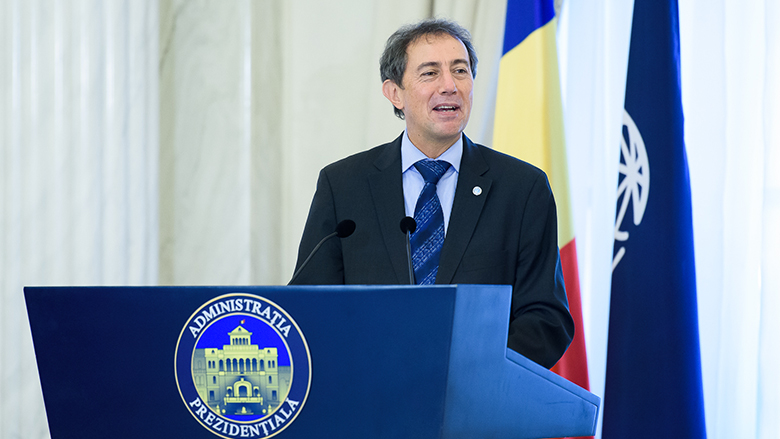Dear President Iohannis,
Dear Prime-Minister Ciolos,
Your Excellencies,
Ladies and Gentlemen,
I would like to start by thanking President Iohannis for hosting us here at Cotroceni Palace. It is an honor to celebrate the 25 years of partnership between the World Bank Group and Romania in this venue.
This is an opportunity to put into perspective the World Bank’s contributions in Romania over the last 25 years, and it is a forum for us all to look towards the future and understand what it will take to build a stronger, more prosperous, and more inclusive Romania.
I have travelled to Romania several times in my life, including when I was a young student. Every time I return, I witness Romania’s progress and I see improvements in the lives of Romanian citizens. I am proud to say that during the 25 years of partnership that we are celebrating today, the World Bank has been a trusted partner to support Romania in tackling some of the most difficult challenges it faced.
The World Bank’s cooperation with Romania started in 1972 when Romania joined IBRD. Our first loan amounting to $60 million was provided for the Tecuci Fertilizer Plant in 1974. We supported emergency reconstruction after floods and the earthquake of 1978, as well as investments in agriculture, energy, water supply and other sectors.
But it is really in the 1990s that we can start speaking of the partnership that we are celebrating today. The early governments of the 1990s were faced with the task of transitioning the country to a market-based economy while protecting those who were vulnerable either in their jobs or their lives.
That is when we resumed lending and advice and opened our office in Bucharest, in the fall of 1991, in a Villa on Dacia Street. Since then the World Bank has been a partner for Romania in most milestones of its transformation and development trajectory.
Back in the 1990s, the Bank provided support for $3 billion in loans and grants for projects and budget support. More than twenty projects were implemented to support Romania’s transition and to provide critically-needed investments in health, education, social protection, child welfare, cultural heritage, and biodiversity preservation.
After the December 1999 decision of the European Union to open accession negotiations with Romania, the collective will of Romanians to become an EU member state, gave impetus to accelerate the transformation and building of institutions. Hence, the World Bank’s engagement shifted to institution-strengthening and governance reforms, while we continued to implement new projects supporting critical sectors to prepare the country for EU accession.

